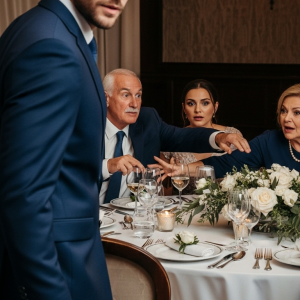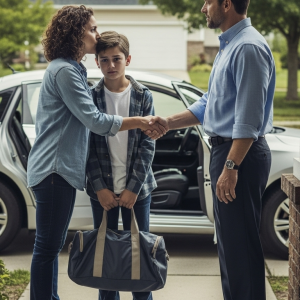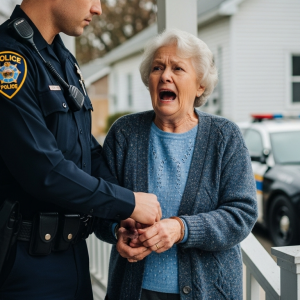My name is Dakota, and I never thought I’d be a widow at thirty-four. Yet here I was, seven months after the accident at the construction site that took my husband, Mark, from us. The grief was a constant, unwelcome guest at my kitchen table, watching me as I tried to get our seven-year-old son, Tommy, ready for school.
The first few months were a blur of paperwork and sleepless nights. I wouldn’t have survived without Sarah and Jim, my in-laws. They were angels, picking Tommy up from school, giving me time to work, and every single time, trying to slip money into my purse.
“Dakota, sweetie, we want to help,” Sarah would insist, her kind eyes full of genuine concern. “You’re family. Let us.”
They knew the company’s life insurance had paid out $300,000. Financially, we were stable. But with Sarah and Jim, it was never about money; it was about a love so unconditional it often brought tears to my eyes. If only my own parents were half as supportive.
For my parents, my older sister Rachel has always been the Golden Child. That favoritism now extended to her three children over Tommy. Last weekend was typical. Tommy, ever curious, asked my father how his antique grandfather clock worked.
“Dakota, can’t you control him?” my mother sighed, rolling her eyes. “He’s always asking questions. Rachel’s kids never give us this much trouble.”
Dad nodded, already reaching for his laptop to distract Tommy with games. Meanwhile, Rachel’s three kids sat in a corner, completely absorbed in their phones, the picture of what my parents considered ideal behavior. I’d learned long ago to bite my tongue.
It started, as it always did, with a favor. My mother had made my favorite lasagna, a clear sign she wanted something. After some unusually cheerful small talk, she got to the point.
“So, Dakota,” she said, carefully cutting her lasagna into perfect squares. “We’ve been meaning to ask. How much was Mark’s life insurance payout?”
The question hit me like a slap. Blindsided, I answered honestly. “About $300,000.”
The fork in Mom’s hand clattered against her plate. Dad’s head snapped up. They stared at me as if I’d just announced I’d won the lottery.
“Well,” Mom said, putting down her fork. “What are you planning to do with all that money?”
“I’ve invested it,” I said, my voice steady. “It’s for Tommy’s future. His college, maybe help with an apartment when he’s older.”
“But that’s years away!” Dad interrupted, waving his hand dismissively. “You should be thinking about the present. About your family.” The way he said family made it clear he didn’t mean Tommy.
A week later, they staged their ambush. At a family dinner, Rachel sighed dramatically about rising prices and bills piling up.
“Your father and I barely have enough for a normal life anymore,” Mom lamented, dabbing at her dry eyes.
Rachel cleared her throat. “I’ve been thinking,” she announced, with a self-righteous expression. “Dakota and I should help Mom and Dad financially. I’ll send them $500 every month.” She paused, then turned to me, her smile not reaching her eyes. “But you, Dakota, you should send them $1,000 monthly.”
“Excuse me?” I nearly choked.
“Well, it makes sense,” she pressed on. “You earn well, you only have one child, and… with your situation… you have other income now.”
Her careful avoidance of Mark’s name made my blood boil. I wanted to scream that I was a widow, that the “other income” was for my son’s future. But Mom was already clapping, and Dad was beaming. The weight of their expectant faces, a pressure I’d felt my whole life, was too much. The words of refusal died in my throat.
“Fine,” I heard myself say. “I’ll do it.”
The first $1,000 transfer felt like a betrayal of Mark’s memory. I told myself it was worth it for the family support, but that fantasy quickly unraveled. Every time I needed help with Tommy, there was an excuse. Mom had a migraine. She was tired. Her back was acting up. Meanwhile, the money left my account like clockwork.
One frustrating Thursday, after Mom claimed she couldn’t watch Tommy because she might be coming down with something, I called Sarah in desperation.
“Of course we’ll get him,” she said without hesitation. “Jim’s already on his way.”
I hung up and fought back tears. A thousand dollars a month bought me nothing but excuses, while my mother-in-law would drop everything for free.
Then came the call a week before Christmas.
“Dakota, honey,” Mom began, her voice syrupy sweet. “About Christmas Eve… we’ve decided to do something different this year. We’re having an adults-only party. No children allowed.”
The pencil I was holding snapped. “What? But it’s Christmas. What am I supposed to do with Tommy?”
“Oh, that’s easy,” she replied, her voice light and dismissive. “You can leave him with Sarah and Jim. They’d love to have him, I’m sure. You’ll come by around seven.”
My heart ached as I looked at Tommy, so completely unaware he’d just been uninvited from his own family’s Christmas.
On Christmas Eve, I pulled up to my parents’ house alone. Walking to the front door, I could hear laughter and music. I opened it, and the world seemed to tilt sideways. The house was packed, but that wasn’t what stopped me. Running through the living room, with paper crowns on their heads, were Rachel’s three kids. Near the tree were my cousin Linda’s children. My cousin Mark’s twins. My cousin Susan’s teenager.
This wasn’t an “adults-only” party. It was a party where only my son wasn’t welcome.
I stood frozen in the doorway as my relatives swarmed me. “Where’s little Tommy?” “Why did you come alone?” Each question was a knife in my gut.
I spotted my mother in the kitchen, calmly arranging cookies on a platter. Anger, cold and sharp, propelled me forward. I led her into the hallway, away from prying eyes.
“You told me this was an adults-only party,” I said, my voice low and controlled. “So why are all the other children here?”
Mom straightened her Christmas sweater, refusing to meet my eyes. “Well, that’s different.”
“Different how?”
“Those children,” she said, gesturing vaguely, “know how to behave at formal gatherings. They’re well-mannered. They deserve to be here more.”
I stared at her in disbelief. Just then, a shriek came from the dining room. Rachel’s youngest was throwing deviled eggs at his sister. I turned back to my mother and raised an eyebrow.
Her face hardened. “That’s just children being children. Don’t be so dramatic, Dakota.”
Something inside me snapped. I walked into the center of the living room and cleared my throat loudly. The music and chatter died. All eyes were on me.
“Several of you have asked why Tommy isn’t here tonight,” I began, my voice strong. “I’m here alone because a week ago, my mother called and told me this was an adults-only party. I was specifically told not to bring my son.”
The room erupted in murmurs.
“But that’s not even the best part,” I laughed, a sound with no humor. “While my son isn’t good enough to attend Christmas, I’m apparently good enough to send my parents $1,000 every month. And Rachel here sends $500.”
Rachel’s husband, Jack, whipped his head around. “Wait, what? What $500?”
The color drained from Rachel’s face. “I… I never actually sent any money,” she stammered. “Mom and Dad asked me to say I was, so Dakota would agree to help them. They said if she thought I was contributing too…”
The silence that followed was deafening. I watched comprehension dawn on my relatives’ faces.
My Aunt Caroline’s voice rang out, sharp and clear. “You scammed your own daughter? You’re nothing but scammers, using her like an ATM while treating her kid like dirt. That’s low, even for you.”
The room exploded. I raised my hand. “I have something else to say.” The room fell quiet again.
“From this moment on,” I said, my voice steady and clear, “I will no longer be sending you any money. And I won’t be maintaining any relationship with you, or Rachel. I’m done.”
I turned and walked out, leaving the sound of a family imploding behind me.
In my car, I cancelled the monthly transfer. It felt like cutting a chain. The drive to Sarah and Jim’s was a blur. When I arrived, I saw Tommy through the window, happily decorating cookies, safe and loved. This, I realized, was what family should feel like.
The next morning, Aunt Caroline called. The party had dissolved after I left. The relatives had walked out en masse, disgusted. Jack had taken his kids and left Rachel, telling her he needed time to think about their marriage.
Messages from my parents and Rachel flooded my phone—apologies, excuses, pleas to talk. I archived them all without responding.
On New Year’s Eve, my parents appeared on my doorstep, clutching a large, expensive-looking gift for Tommy.
“We know we were wrong,” Mom pleaded. “We’re truly sorry.”
I studied their faces. “Are you sorry because you realize what you did was wrong,” I asked quietly, “or are you sorry because the entire family knows what you did and won’t speak to you anymore?”
The shared glance between them was my answer.
“I think you should leave,” I said. “Family doesn’t manipulate each other. Family doesn’t exclude a child from Christmas. What you did… that’s not family.”
I closed the door, not with sadness, but with relief. In the months that followed, I built a new life. My aunts, uncles, and cousins rallied around us. We had Sunday dinners and barbecues. They celebrated Tommy, encouraging his questions, delighting in his curiosity. He flourished, surrounded by people who loved him for who he was. Cutting toxic people out of my life didn’t leave a void; it made room for real love to grow.
In the weeks that followed the family fallout, I found myself in a strange place. It wasn’t grief or anger that I felt anymore. It was a sense of calm, of empowerment. For the first time in a long time, I wasn’t being manipulated, guilted, or played for a fool. My life was mine again, and more importantly, Tommy’s life was his own.
The house felt lighter, quieter—no more tension in the air, no more tiptoeing around. It was just us. I realized how much I had underestimated the weight of the constant emotional burdens. With every toxic relationship removed, there was more space for joy, for simple pleasures.
Sarah and Jim were our safe haven. Every weekend, they welcomed Tommy and me into their home like we were family—not just in title, but in spirit. It wasn’t just about the material things they offered; it was the genuine love and understanding they provided, especially when it felt like the world had been so unfair to us.
“I’ve never seen him so happy,” Sarah said one Sunday as Tommy ran around the yard with their dog, a golden retriever named Max. “You’re doing such a good job, Dakota.”
I smiled softly, my heart full. “I’m just trying to make sure he has a better life than I did. He deserves that.”
“He’s got everything he needs right here,” Jim added, his eyes glinting with pride as he watched Tommy laugh and chase Max through the yard.
The first family holiday we had after everything collapsed was Thanksgiving. For the first time, I didn’t have to worry about appearances, about fake smiles, or pretending that everything was fine. Sarah and Jim invited some of their extended family over, and it felt like real family. They welcomed us with open arms. Tommy was in his element, surrounded by people who encouraged his natural curiosity and loved him for who he was, not for the potential he could be for someone else’s gain.
At dinner, Sarah gave a toast. “To family. To the ones we choose, and to the ones we are born into. And especially, to Dakota and Tommy—who have been through so much and are still standing stronger than ever.”
I felt my throat tighten as I looked across the table at Sarah, then at Tommy, who was smiling widely. This, right here, was family. This was love.
Meanwhile, Rachel and my parents continued to reach out. I ignored their calls and messages, knowing full well they were doing it out of guilt, not understanding. My mother sent a few packages of overpriced clothes for Tommy, and Dad once texted to ask if I wanted to meet for lunch. I never responded.
Rachel, for her part, sent me a letter a few weeks after Christmas. She apologized in a way that felt rehearsed, as if she had learned the words from a book. The letter ended with, “I hope one day we can rebuild. I’m sorry for everything I did.”
I didn’t reply. I wasn’t sure if I would ever be able to rebuild with her. The betrayal went too deep, and I had no interest in playing the victim anymore. What I wanted now was peace, and that peace was something I was building on my own terms.
It was on a rainy Saturday afternoon that I received the phone call that I hadn’t expected. It was from a lawyer’s office, and I braced myself for whatever bad news they might have for me.
“Ms. Wilson, this is Kenneth Moss, from the firm Moss & Brody. I’m calling in regard to the life insurance payout from your late husband’s policy. We’ve been in contact with a third party regarding the remaining balance in that account. It appears there were additional funds that were not disclosed initially.”
I blinked in confusion. “Additional funds?”
“Yes. After a thorough investigation, we discovered that your husband’s company had put aside a separate emergency fund specifically for his widow and child in case of such an incident. It’s been sitting in a trust fund, untouched, for the last seven months.”
I felt my heart skip. “How much?”
“It’s a substantial amount,” the lawyer continued. “Over $200,000. The funds are now available to you, and we’re processing the release immediately.”
I couldn’t believe it. After all that had happened, there was still more money, untouched and waiting for us. It wasn’t a fortune, but it felt like the final piece of the puzzle. It wasn’t the money that mattered—it was the fact that Mark had cared for us even when he was gone.
I hung up the phone and sat for a moment, processing. Tommy had never been truly affected by the financial struggles after Mark’s death, but now, I could feel a new sense of security. I’d be able to provide for him without worry, and it was like a weight had been lifted off my shoulders.
Life moved on. I didn’t stay in touch with my parents, but I did get occasional messages from my aunts and uncles. They were worried about my isolation and hoped that one day I’d forgive my parents. But I’d learned the hard way that some relationships weren’t worth repairing. What mattered now was building my life with Tommy, with Sarah and Jim, and with the people who saw us as family.
It was a few months later when I received another message, this one from Rachel. She was asking for forgiveness again, but this time, her words were more genuine. She admitted that she had hurt me beyond repair, and she wished things had been different.
I didn’t respond. I wasn’t angry anymore, but I had nothing to say. Rachel had made her choices, and I had made mine. The past was over, and I wasn’t looking back.
It was late spring when I met someone new. His name was Daniel, and he was a friend of a friend who had been coming over for weekly dinners with Sarah and Jim. He was kind, funny, and not afraid of the baggage I carried. Most importantly, he never tried to fix me. He simply wanted to spend time with me, and I appreciated that more than I could say.
One afternoon, he looked at me, his eyes full of understanding, and said, “You’ve been through so much. But you’re here. And I’m so grateful for that.”
I hadn’t realized until that moment how much I’d been holding onto. For the first time, I felt like I didn’t have to prove anything to anyone. I didn’t have to be the strong one, the responsible one, or the person who always gave and never asked for anything.
Tommy was thriving. He had become a curious, intelligent, and compassionate child, and I knew in my heart that Mark would have been so proud of him. I was proud of him. He was everything I had hoped he would be—my light in the darkness.
It was a year after the family drama, the betrayal, and everything that came with it, when I sat on the porch with Sarah, my glass of wine in hand, and Tommy ran around with Max, laughing in the distance. The sound of his joy filled me with a quiet peace.
“I’m glad you’re here,” Sarah said, her voice warm. “I’m glad you’re happy.”
“Me too,” I said softly. “Me too.”
For the first time in a long time, I truly meant it.




